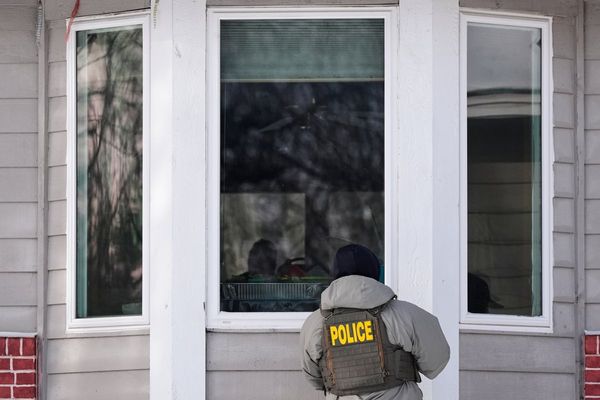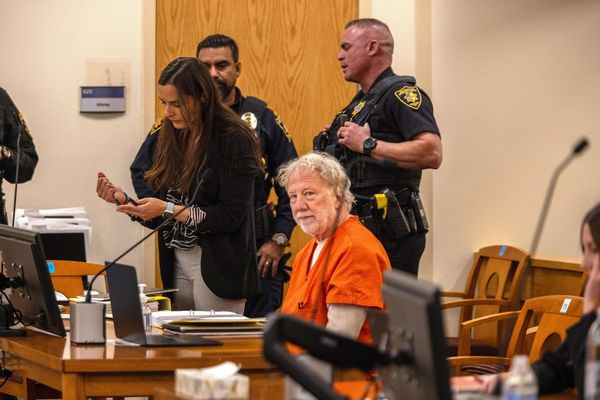.jpeg?width=1200&auto=webp&crop=3%3A2)
The Last Incel is one of those theatre shows that feels so timely it’s like having the conscience of a nation played out in front of you.
Taking place at the Pleasance Theatre, it is about three incels – those involuntary celibates who have been thrust back into the public consciousness after the huge reaction to Netflix’s Adolescence – who gather in chat rooms to share bitter rage at the world and particularly women, who they hate because those women are not interested in them. Society has trained them that way, and so they will turn their involuntary celibacy into a choice, and a rejection of society and its females.
That is, until one of them actually sleeps with a woman, who appears one morning on-screen with one of the incels. Who seems to have actually quite liked the intimate encounter.

Writer-director Jamie Sykes, who has a background in comedy back in Dublin, says, “It started because I was seeing more and more incel culture filter into my life. Particularly in gaming. There was this movement called Gamergate, where they got very angry at female representation in gaming and female journalism in gaming.
So I was just aware of incels and finding it such an absurd ideology, and inherently funny. It's obviously horrible, but the idea that you can't have sex, and then your solution is to adopt a worldview that guarantees you can't have sex, is inherently self-defeating and felt right for comedy.
I thought it'd be fun to write like a sketch or a satire, but then the more I researched it, the more I saw how tragic and horrible their lives are and how they affect other people's, so it developed into more of a play.”
Sykes pulled the play together in Dublin, then took it to Edinburgh fringe where it created quite a buzz. But as it lands at the Pleasance Theatre, it now seems more relevant than ever, with Toxic Masculinity back in the news and post-Adolescence concerns about the behaviour of young men; along with actual real-world violence and dysfunction.
Sykes says he had to spend more than his fair share of research time on incel chat rooms. He says it was mostly quite sad:
“I saw how hopeless a lot of them are and how miserable they are and isolated. A lot of them have been bullied in school or come from broken homes or are neurodivergent, or have mental health problems and haven't got the resources to address those issues.
Then this community and this little ideology is the one place where they felt a sense of acceptance and camaraderie. It's the one solace they've had to rally around.”
He says what surprised him most was that it was ideology without a solution. Incels don’t want anything, it’s more nihilistic than that.
“It's like, we live in a world where women only have sex with attractive men, and you're not attractive, so you'll never have sex.
They have this term called the black pill, like in The Matrix, and you take the black pill when you accept the fact that we live in a world where hot guys get sex and you are not hot, so you will never have sex.
It’s an ideology of hopelessness, it’s a philosophy that justifies inaction and not having to engage with the world.”
The play itself sets this up with its characters Cuckboy (Fiachra Corkery), Ghost (GoblinsGoblinsGoblins), Crusher (Jackson Ryan) and Einstain (Jimmy Kavanagh) communicating in isolation from each other in a chat room. Only for Margaret (Justine Stafford) to then show up.
.jpeg)
The trick for Sykes was to create something that didn’t shy away the depressing world of incels, but which was also funny, moving and actually does shift them out of their inertia.
“Comedy is often about like taking an absurd thing and ‘straight man-ing’ it in some way,” he says, “So just taking that ideology, and drawing out it's most heightened elements and then putting it into a context where somebody can challenge it, felt like it had the potential to be funny.
Also if you read the forums, a lot of it is really performative suffering. They have genuinely suffered, many have had horrible lives, but it's very much about, ‘Look at me, look at how miserable my life is.’
I really thought it'd be more interesting to talk about it in a framework where you didn't vindicate that element of suffering and that nihilism, but which presented it in a context that could strip away some of the negativity and presented some kind of hopefulness to it.”
And that is exactly why The Last Incel has been creating such a buzz. It is not an opportunity to laugh at incels as such, it is a chance to explore how young humans like this become so caught up in incel ideology – and how they might find their way out of it.
It is also stylishly staged as if it were an actual digital space, with the actors framing themselves in chat windows. In other words, it’s fun.
“It's very much a farce, particularly when this woman enters their group for the first time, Margaret,” he says, “Seeing the rubber meet the road, where they have to stand up for their ideology for the first time in real life, with a real breathing woman and seeing them being challenged.
Each of the boys are on a different spectrum of radicalisation. As it evolves, you see what they're getting out of this world and whether they can find some kind of redemption.”
He says he was impressed by Adolescence, and how it showed how insidious this kind of manosphere culture can be, to the extent that it can happen under your nose in your own house. But he stresses that this play looks at a different area where the boys are just completely disengaged from life and non-participatory.
Such nuances are really where theatre comes into its own, humanising these people, and shining a light both on them and towards the open door.
“I’m a sensitive person,” says Sykes, “I find it very hard to sit in something that is just unpleasant and dark. But part of the joy of storytelling is that you can provide some kind of catharsis and a way to engage with a subject that you just wouldn't be able to look at otherwise.”
Well indeed, and for this rising theatre star, his real Joker card is comedy:
“When somebody has bought into an ideology so deeply, it's hard to see the person underneath, and the comedy is great at separating the two. You can satirise the ideology and then hopefully see the person that was underneath it.”
The Last Incel is at the Pleasance Theatre until 31 May







